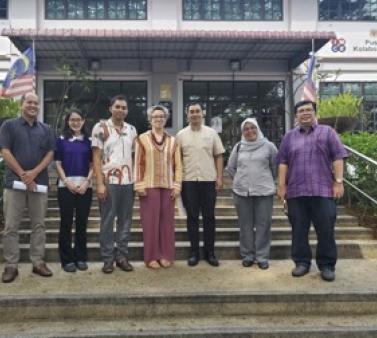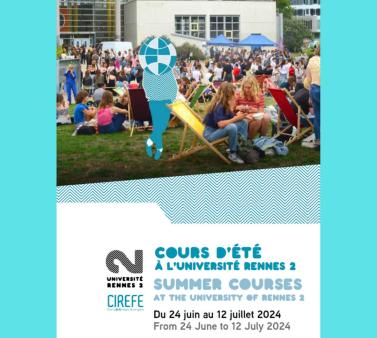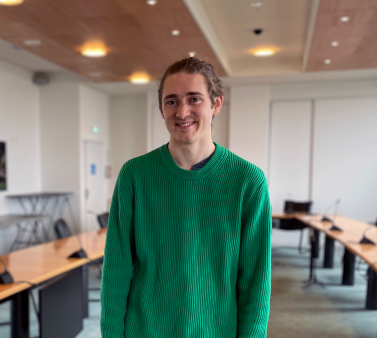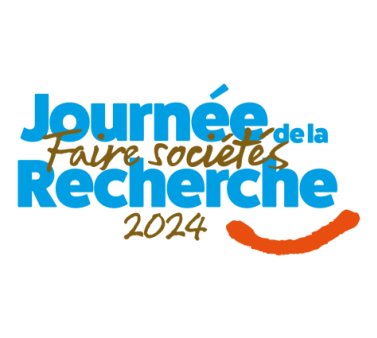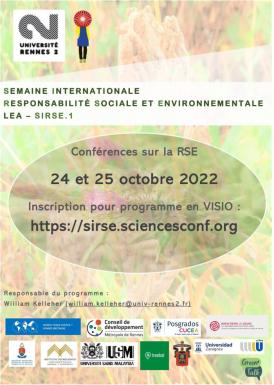
At the end of the month of October, Rennes 2 will be holding the first edition of its International Social and Environmental Responsibility Week (SIRSE.1). The objective of the class and series is to introduce students to research perspectives on the theme of social and environmental responsibility and help them to explore ways in which they too might contribute to this increasingly critical field as they advance in their academic, professional and personal journeys. This class, created for graduate students, falls into the category of a ‘unité d'enseignement d'ouverture (UEO)’, which offers them the chance to broaden their specialized degrees and learn from a wider field of knowledge.
This event is also taking place within the framework of Rennes 2’s ‘internationalization at home’ program, which seeks to increase the interactions between local and international students and faculty on important research topics through the use of digital technology. As such, the first two days of the SIRSE program will be dedicated almost entirely to online presentations on topics such as: regional policy development frameworks, corporate social investment, green project financing, social and environmental responsibility in higher education and more. The conference speakers are all international faculty members and professionals working in the field.
Below, we speak with Rennes 2 Lecturer William Kelleher to get more information about this new offering.
Could you please tell us what made you decide to create an open conference series within the framework of the class?
Well, we began discussing the idea with my colleagues as we were creating the new class offering for the next 5 years of our program (from 2022 through 2027). We were looking for poignant and relevant research topics to present to our students and ones that could be done in such a way that they could truly benefit from the experiences of people who are working on the ground, here in France and elsewhere.

There is a very clear and urgent need to discuss and address social and environmental responsibility, as the environment is a big part of who we all are. So the first two days, October 24th and 25th, will be exclusively dedicated to the conference series on that theme. That’s also why we decided to open the conference series up to the larger student community. It would be a shame not to be able to offer this experience to others who might be interested.
Could you please tell us what made you decide to create an open conference series within the framework of the class?
Well, we began discussing the idea with my colleagues as we were creating the new class offering for the next 5 years of our program (from 2022 through 2027). We were looking for poignant and relevant research topics to present to our students and ones that could be done in such a way that they could truly benefit from the experiences of people who are working on the ground, here in France and elsewhere. There is a very clear and urgent need to discuss and address social and environmental responsibility, as the environment is a big part of who we all are. So the first two days, October 24th and 25th, will be exclusively dedicated to the conference series on that theme. That’s also why we decided to open the conference series up to the larger student community. It would be a shame not to be able to offer this experience to others who might be interested.
Yet, obviously, with this being a graduate level class offered within the field of Applied Foreign Languages (students are enrolled into one of 3 academic pathways: Management and International Marketing, International Trade in Europe-Asia, or International Trade in Latin America and the Iberian Peninsula), it was also important to us that the class speak about specific research outcomes and specific kinds of topics or needs. So, the second half of the week will really be the teaching part of the week, with students being organized into groups for practical workshops. We have some really nice things lined up for them. We've involved the Rennes 2 Espace des langues who have created an escape game around the themes that are being discussed. We asked the Service Universitaire de Pedagogie (SUP) to help us show our students how to integrate the work that they create into a growing kind of e-portfolio that they can take forward. We've also asked a graphic artist to come in to help them with the visual presentation of the research posters that they’ll need to create.
What made you decide to hold the conference series virtually?
Well, for one, there’s an urgent need for each of us to reduce our carbon footprints. Why use up carbon when you can just turn on your Zoom? We’re increasingly trying to find ways to enhance the ways we teach so that it becomes more sustainable. Second, this kind of approach falls directly into the framework of ‘internationalization at home’, which helps to make it more open. Our Vice President for Internationalization, Lesley Lelourec, along with the International Office and the SUP have been very instrumental in helping to promote these kinds of programs and increase the number of similar collaborative projects.
So, it’s great to have flexibility in terms of who can be invited to speak and also who can participate. We can now accommodate up to 300 participants while using Zoom. And we have some very interesting speakers lined up so hopefully our students will be enthused and inspired by what we’re offering.
Can you tell us a bit about the speakers?
We’ll be opening the series with a presentation from Luana Malan. She's a Corporate Social Investment Specialist at the Industrial Development Corporation in South Africa, and she’s also a spoken word artist. She’s in a large consortium and yet she’s very hands-on with social and environmental responsibility. She’ll be speaking about how to craft strategic, innovative and sustainable solutions for individuals, programs and businesses that are aspiring for greatness. Martha Stein Sochas, a former Director of Operations for the French Development Agency is another person we invited. She’ll be speaking on green project financing in South Africa. We will also have Dr. Fazelina Sahul Hamid, who is a Lecturer in the economic section of the School of Distance Education at the Universiti Sains Malaysia. She’ll be speaking on the interface between behavioral biases and consumer debt, and their ramifications for social and environmental responsibility.
Equally important, are the local speakers who will be participating, like Jennifer Ramsay, who is associated with the Rennes World Trade Center, a club operated for and created by business leaders working internationally. Dominique Chauffart, from the Rennes Metropole Development Council, will also join us to talk about regional development policy frameworks. So it's a really nice mix of local actors, policy developers, international actors, and then academics.
Were these contacts that you already had?
No, it took a while to get everyone together. I mean, some of the people obviously knew and asked straight away because I knew they'd be interesting. While other people, like Dominique Chauffart, I met by getting more acquainted with development activities being done in Rennes. I've come to learn that Rennes 2 has a very active and engaging relationship with civil society and that’s one of the reasons why I was motivated to teach here. Leszek Brogowski, our Vice President for Culture, Science and Civil Society, has helped to create a very interesting initiative, called Univer.Cité. Its aim is to implement a dialogue between science and civil society by forging links between citizens, researchers and decision-makers. In addition, the project is taking place in cooperation with the Université du Québec à Montréal (UQAM), privileged partners of Rennes 2. So we have this great cooperation that is really helpful in being able to focus on transversing research axes at an international level, and it’s important to continue these kinds of projects and deepen the relationships.

